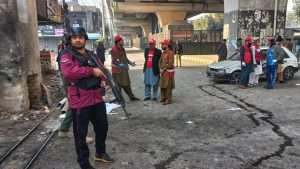Gaza faces health crisis amid toxic water contamination

The water crisis has an outsized impact on women, one of the commission’s co-chairs said. Photograph: Anjum Naveed/AP
Israel’s attacks in Gaza have damaged the water and sanitation systems, leaving many residents without safe drinking water, reported Al Jazeera on 8 November.
In Gaza City’s Sheikh Radwan neighbourhood, a once vibrant community and where what used to be a rainwater pond now swells with sewage and debris after Israeli air strikes destroyed key pumps and disabled the sanitation network.
Displaced families, including pregnant women like Umm Hisham, walk through the polluted water because they have nowhere else to go.
“We took refuge here, around the Sheikh Radwan pond, with all the sufferings you could imagine, from mosquitoes to sewage with rising levels, let alone the destruction all around. All this poses a danger to our lives and the lives of our children,” she told Al Jazeera’s Ibrahim Alkhalili.
According to Maher Salem, a Gaza City municipal officer, the pond’s water has risen over 6 metres (20 feet). The fence is destroyed, creating a risk that “any child, woman, old man, or even a car” could fall in. Local officials warn that the stagnant water could trigger disease outbreaks, particularly among children.
For many Palestinians, there is no safe alternative. As Hani Mahmoud told All Jazeera, families know that water from wells, containers, or water trucks is “polluted and contaminated … but they don’t have any other choice.”
At the COP30 climate summit in Brazil, Palestinian Ambassador Ibrahim Al-Zeben described Gaza’s condition as an environmental catastrophe intertwined with what he called Israel’s genocide.
“There’s no secret that Gaza is suffering because of the genocide that Israel continues to wage, a war that has created nearly a quarter of a million victims and produced more than 61 million tonnes of rubble, some of which is contaminated with hazardous materials,” he said.
He added, “The deliberate destruction of sewage and water networks has led to the contamination of groundwater and coastal waters. Gaza now faces severe risks to public health, and environmental risks are increasing.”
Israel’s bombardment has also devastated Gaza’s agricultural land, leaving the enclave in a state of “severe food insecurity and famine with food being used as a weapon,” al-Zeben added.
A UN report cited by Al Jazeera warns that “Gaza’s freshwater supplies are severely limited and much of what remains is polluted.”
It said that sewage-treatment infrastructure has collapsed, piped systems have been destroyed, and cesspits are being used for sanitation. This increases contamination of the aquifer that provides much of Gaza’s water.
Back in Sheikh Radwan, there is a sense of despair as Hand Mahmoud said, “When every day is a fight to find water, food, and bread … safety becomes secondary.”
Al Jazeera and Maghrebi.org
Want to chase the pulse of North Africa?
Subscribe to receive our FREE weekly PDF magazine











